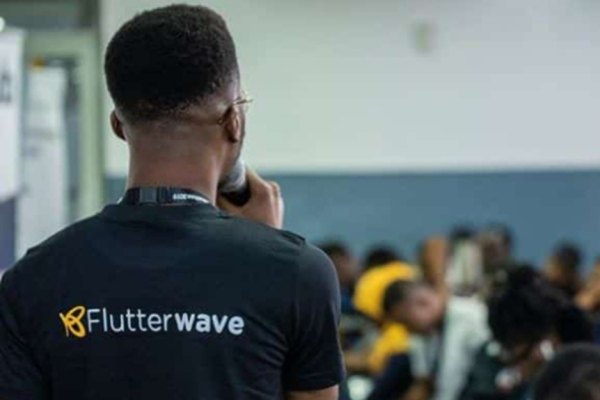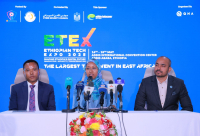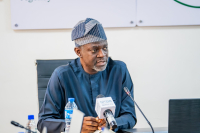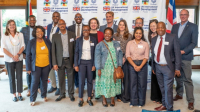
Brief (445)
Flutterwave, an African payments technology company, has introduced the 'Flutterwave Accelerate Workshop,' a two-day (April 26 and May 3, 2025) virtual program aimed at providing young Africans with practical skills essential for the tech industry.
The workshop targets youth stepping out of school, offering direct access to industry experts in four high-demand fields: Data, Design, Marketing, and Product.
Beyond technical training, the workshop aims to develop participants’ soft skills and provide insights into the realities of working in African tech startups. Participants can register for one class per day and are encouraged to select sessions aligning with their career goals.
Moniepoint, a Nigerian fintech unicorn, has introduced Monieworld, a remittance platform enabling UK residents to send money directly to Nigerian bank accounts using various payment methods, including Monieworld accounts, cards, British bank accounts, Apple Pay, and Google Pay.
Monieworld operates under a Nigerian international money transfer operator license via its subsidiary, Global Wire, and partners with PayrNet, a licensed electronic money institution in the UK.
The app is now available for download on both the Apple App Store and Google Play Store.
Intel has launched the 2025 edition of its Community Reach Program, inviting proposals for AI and broadband-powered projects aimed at underserved communities across African Union member states.
The initiative seeks to support solutions in STEM education, healthcare, agriculture, environmental services, fintech, and digital skills readiness. Organizations, startups, SMEs, and institutions leveraging AI, particularly Edge AI and AI PCs, and broadband connectivity are encouraged to apply.
Selected applicants will receive technical support, capacity-building opportunities, and consultancy services to scale their solutions. Applications are open until June 13, 2025.
South African fintech company Stitch has secured $55 million in a Series B funding round led by QED Investors. The round also included participation from Flourish Ventures, Glynn Capital, Norrsken22, and existing investors such as Ribbit Capital and PayPal Ventures. Notably, comedian and entrepreneur Trevor Noah joined as an angel investor.
Stitch plans to use the funds to enhance its in-person payments offering, introduce card acquiring capabilities, and strengthen its online payments suite to better serve enterprise clients across Africa.
With this funding, Stitch is well-positioned to continue its mission of transforming the payments landscape in Africa and beyond.
The Africa Tech Summit London returns for its ninth edition on June 6, 2025, at the London Stock Exchange, bringing together African tech leaders, investors, and global partners to drive collaboration and investment across the continent’s tech ecosystem.
Preceding it, the Africa Climate Tech & Investment Summit on June 5 will focus on innovations at the intersection of climate, technology, and finance, showcasing solutions for Africa’s green transition and climate resilience.
Under the theme “Where African Tech Connects,” both summits offer a platform to explore trends, build partnerships, and connect with key players shaping Africa’s digital and climate future.
TerraPay, a global money movement company, and PayPal, a global digital payments and commerce platform, have entered a partnership to enable real-time fund transfers across the Middle East and Africa (MEA) for PayPal customers.
The collaboration, announced on April 15, aims to expand financial access by connecting banks, mobile wallets, and financial institutions, making cross-border transactions faster and more accessible.
Through this partnership, users can link mobile wallets or bank accounts to PayPal and transfer funds seamlessly. The partnership is set to strengthen the region’s financial infrastructure and support broader participation in the global economy.
Ethiopia will host ETEX 2025, the Ethiopian Tech Expo, from May 16 to 18, 2025. The event highlights Ethiopia’s rapid digital transformation.
Organized by QNA and hosted by the Information Network Security Administration (INSA) and the Ethiopian Artificial Intelligence Institute (EAII), the event will gather over 10,000 attendees, 100+ speakers, 200+ government entities, and 100+ exhibitors. It will feature a hackathon, AI & robotics competitions, and research showcases.
Key Themes include Cybersecurity & Digital Trust, Artificial Intelligence & Emerging Tech, and Smart Cities & Digital Infrastructure, among others.
The National Information Technology Development Agency (NITDA) has officially inaugurated the Local Organising Committee (LOC) for the upcoming GITEX Nigeria 2025, marking a key milestone in the country’s tech advancement journey.
The formation of the LOC is a strategic step toward hosting Nigeria’s first-ever edition of GITEX, a globally recognized tech exhibition and conference. The event aims to catalyze innovation, attract investments, and elevate Nigeria’s standing in the global digital economy.
With preparations now underway, GITEX Nigeria 2025 promises to be a landmark platform for showcasing local innovation and connecting Nigeria’s tech ecosystem with global players.
Unilever South Africa, the British High Commission, and global professional services organization EY have awarded over R9 million ($455,832.39) in funding to four South African startups tackling plastic waste.
The support, announced by Unilever South Africa on April 7, includes tailored mentorship and business development assistance under the Transform South Africa initiative, which promotes sustainable solutions and community development.
This new cohort joins previous Transform-supported ventures like Oxfam South Africa’s Social Factory, Imagineif, and Loowatt. Together, they form part of a global movement across 17 countries, bringing scalable, inclusive solutions to millions.
The Give1Project, in partnership with Concordia University and the United Nations Development Program (UNDP), has launched the second cohort of its Regional Cybersecurity Training Program to train 150 young people across West and Central Africa.
Participants will gain practical skills in cybersecurity and receive industry-recognized certification. They will also have access to mentorship, networking opportunities, and potential pathways to internships, employment, or entrepreneurship.
Applicants must be between 18 and 35 years old and be a citizen of one of the 24 countries in West and Central Africa. They must be currently enrolled in or have graduated from a university or technical institution.
The deadline for application is 17 April 2025.
More...
Global payment technology giant Mastercard announced on April 3 a partnership with Nomba, an African payment solutions provider. The collaboration aims to deliver faster, safer, and more seamless payment experiences for businesses across the country while advancing financial inclusion.
As part of the partnership, Mastercard’s trusted Gateway platform will be integrated into Nomba’s Checkout solution. This integration enables businesses to access a broader range of secure payment options, including international cards, QR codes, and other digital methods, thereby enhancing customer experience and boosting operational efficiency.
The Ministry of Information, Communications, and the Digital Economy, in partnership with the Ministry of Interior and the Slovakian Government, has launched a 10-week Cybergame Challenge running until June 9, 2025.
Themed "Unlocking Your Cyber Security Potential," the competition aims to identify and nurture cybersecurity talent. Entry is free, with weekly challenges in different categories. Kenyan citizens qualify for prizes, while non-citizens can participate as non-competing players.
Winners will receive tech gadgets, cybersecurity training vouchers, software licenses, and tech store gift vouchers. Top performers may join Kenya’s National Cyber Security Team for regional and global competitions.
The SMART Zambia Muchinga Province team has deployed six internet access points at the Nakonde border post to enhance Zambia Revenue Authority (ZRA) operations, improving cargo clearance and efficiency.
The upgrade, announced March 31, will speed up cargo processing by strengthening connectivity. The project was implemented in collaboration with ZRA Nakonde ICT Officer Dennis Machaya.
The initiative supports the government's goal of leveraging technology to enhance trade and regional economic integration.
Katsina State, Nigeria, is set to host Arewa Tech Fest 2025. The event will bring together industry leaders, startups, investors, and tech enthusiasts on May 21-22, 2025, at the Katsina Directorate of ICT Complex, KSITM.
Themed "Innovating for Impact: Technology as a Catalyst for Economic Transformation," the event will explore how technology drives economic growth and entrepreneurship in Northern Nigeria.
Attendees will connect with key industry players, explore investment opportunities, and engage in panel discussions, workshops, and product showcases. Topics will cover AI, fintech, and digital innovation.















